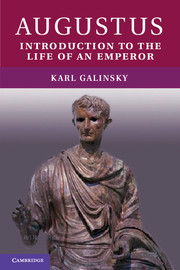GeneralBleicken, J., Augustus: eine Biographie (Berlin 1998).
Bringmann, K., Augustus (Darmstadt 2007).
Champlin, E. and others, eds., The Cambridge Ancient History, vol. 10, 2nd ed. (Cambridge 1996).
Cooley, A. E., Res Gestae Divi Augusti: Text, Translation, and Commentary (Cambridge 2009).
Galinsky, K., Augustan Culture: An Interpretive Introduction (Princeton 1996).
Galinsky, K., ed., The Cambridge Companion to the Age of Augustus (Cambridge 2005).
Kienast, D., Augustus: Prinzeps und Monarch, 4th ed. (Darmstadt 2009).
Raaflaub, K., and Toher, M., eds., Between Republic to Empire: Interpretations of Augustus and His Principate (Berkeley and Los Angeles 1990).
Scheid, J., Res Gestae Divi Augusti (Paris 2007).
Syme, R., The Roman Revolution (Oxford 1939).
Zanker, P., The Power of Images in the Age of Augustus (Ann Arbor 1988).
SourcebooksCooley, M. G. L., ed., The Age of Augustus. LACTOR 17 (London Association of Classical Teachers 2008).
Sherk, R., Rome and the Greek East to the Death of Augustus. Translated Documents of Greece and Rome 4 (Cambridge 1984).
CHAPTER 1Goldsworthy, A., Caesar: Life of a Colossus (New Haven 2008).
Malitz, J., Nikolaos von Damaskus: Leben des Kaisers Augustus (Darmstadt 2003).
Smith, C., and Powell, A., eds., The Lost Memoirs of Augustus and the Development of Roman Autobiography (Swansea 2009).
CHAPTER 2Goldsworthy, A., Antony and Cleopatra (New Haven 2010).
Kleiner, D., Cleopatra and Rome (Cambridge, MA 2005).
Mackay, C., The Breakdown of the Roman Republic (Cambridge 2009).
Osgood, J., Caesar’s Legacy: Civil War and the Emergence of the Roman Empire (Cambridge 2006).
Schiff, S., Cleopatra: A Life (New York 2010).
CHAPTER 3Feeney, D., Caesar’s Calendar (Berkeley and Los Angeles 2007).
Flower, H., Roman Republics (Princeton 2010).
Gowing, A., Empire and Memory: The Representation of the Roman Republic in Imperial Culture (Cambridge 2005).
Purcell, N., “Romans in the Roman World,” in Galinsky (2005) 85–105.
Wallace-Hadrill, A., “Mutatas Formas: The Augustan Transformation of Roman Knowledge,” in Galinsky (2005) 55–84.
Galinsky, K., Rome’s Cultural Revolution (Cambridge 2008).
CHAPTER 4Gruen, E., “Augustus and the Making of the Principate,” in Galinsky (2005) 33–51.
Lintott, A., The Romans in the Age of Augustus (Oxford 2010).
Lott, J. B., The Neighborhoods of Ancient Rome (Cambridge 2004).
Mattern, S., Rome and the Enemy: Imperial Strategy in the Principate (Berkeley and Los Angeles 1999).
Rich, J. W., “Augustus, War and Peace,” in J. Edmondson, ed., Augustus (Edinburgh 2009) 137–64.
Scheid, J., “Augustus and Roman Religion: Continuity, Conservatism, and Innovation,” in Galinsky (2005) 175–93.
CHAPTER 5Balsdon, J. P. V. D., Roman Women: Their History and Habits (London 1962).
Barrett, A., Livia: First Lady of Imperial Rome (New Haven 2002).
Bartman, E., Portraits of Livia: Imagining the Imperial Woman in Augustan Rome (Cambridge 1999).
Dennison, M., Empress of Rome: The Life of Livia (London 2010).
Fantham, E., Julia Augusti: The Emperor’s Daughter (New York 2006).
Kleiner, D., “Semblance and Storytelling in Augustan Rome,” in Galinsky (2005) 197–233.
Levick, B., “Tiberius’ Retirement to Rhodes in 6 BC,”Latomus 31 (1972) 779–813.
Purcell, N., “Livia and the Womanhood of Rome,” in J. Edmondson, ed., Augustus (Edinburgh 2009) 165–94.
Raaflaub, K., and Samons, L., “Opposition to Augustus,” in Raaflaub and Toher (1990) 417–54.
Roddaz, J.-M., Marcus Agrippa (Rome 1986).
Treggiari, S., “Jobs in the Household of Livia,”Papers of the British School at Rome 43 (1975) 48–77.
Wiseman, T. P., “The House of Augustus and the Lupercal,”Journal of Roman Archaeology 22 (2009) 527–45.
CHAPTER 6Davies, P., Death and the Emperor: Roman Imperial Funerary Monuments from Augustus to Marcus Aurelius (Cambridge 2000).
Favro, D., The Urban Image of Augustan Rome (Cambridge 1996).
Hardie, P., ed., Paradox and the Marvellous in Augustan Literature and Culture (Oxford 2009).
Haselberger, , Urbem adornare: Rome’s Urban Metamorphosis under Augustus (Portsmouth, RI 2007).
Stern, R., Modern Classicism (New York 1988).
Strong, D., and Ward Perkins, J., “The Temple of Castor in the Roman Forum,”Papers of the British School at Rome 30 (1962) 1–32.
White, P., Promised Verse: Poets in the Society of Augustan Rome (Cambridge, MA 1993).
CHAPTER 7Ando, C., Imperial Ideology and Provincial Loyalty in the Roman Empire (Berkeley and Los Angeles 2000).
Chua, A., Day of Empire: How Hyperpowers Rise to Global Dominance – and Why They Fall (New York 2007).
Galinsky, K., “The Cult of the Roman Emperor: Uniter or Divider?” in Brodd, J. and Reed, J., eds., Rome and Religion: A Cross-Disciplinary Dialogue on the Imperial Cult (Atlanta 2011) 1–21, 215–25.
Garnsey, P., and Saller, R., The Roman Empire: Economy, Society and Culture (London 1987).
Harris, W., Rome’s Imperial Economy (Oxford 2011).
Kellum, B., “Representations and Re-Presentations of the Battle of Actium,” in Breed, B. et al., eds., Citizens of Discord (Oxford 2011) 187–207.
Kulikowski, M., Review of G. Woolf, Becoming Roman: The Origins of Provincial Civilization in Gaul [1998], Bryn Mawr Classical Review (1999) 02.09.
MacMullen, R., Romanization in the Time of Augustus (New Haven 2000).
Mattingly, D., Imperialism, Power, and Identity: Experiencing the Roman Empire (Princeton 2011).
Price, S. R. F., Rituals and Power: The Roman Imperial Cult in Asia Minor (Cambridge 1986).
Revell, L., Roman Imperialism and Local Identities (Cambridge 2009).
Richardson, J., The Language of Empire: Rome and the Idea of Empire from the Third Century BC to the Second Century (Cambridge 2008).
Wallace-Hadrill, A., “Image and Authority in the Coinage of Augustus,”Journal of Roman Studies 76 (1986) 66–87.
Whitmarsh, T., ed., Local Knowledge and Microidentities in the Imperial Greek World (Cambridge 2010).
Woolf, G. “Provincial Perspectives,” in Galinsky (2005) 106–29.
CHAPTER 8Burns, J. M., Leadership (New York 1978).
Galinsky, K., “Vergil’s Aeneid and Ovid’s Metamorphoses as World Literature,” in Galinsky (2005) 340–58.
Levick, B., Augustus: Image and Substance (London 2010).
Max-Planck Award Project “Memoria Romana” on memory in Rome, available at: .
Mayer-Schӧnberger, V., Delete: The Virtue of Forgetting in the Digital Age (Princeton 2010).
Momigliano, A., Review of Syme, R., The Roman Revolution (1939), Journal of Roman Studies 30 (1940) 75–80.
Treggiari, S., “Social Status and Social Legislation,”Cambridge Ancient History 2 10 (1996) 873–904.





